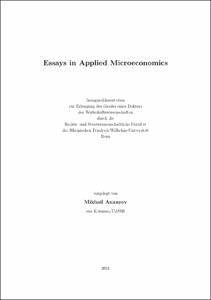Ananyev, Mikhail: Essays in Applied Microeconomics. - Bonn, 2021. - Dissertation, Rheinische Friedrich-Wilhelms-Universität Bonn.
Online-Ausgabe in bonndoc: https://nbn-resolving.org/urn:nbn:de:hbz:5-63188
Online-Ausgabe in bonndoc: https://nbn-resolving.org/urn:nbn:de:hbz:5-63188
@phdthesis{handle:20.500.11811/9224,
urn: https://nbn-resolving.org/urn:nbn:de:hbz:5-63188,
author = {{Mikhail Ananyev}},
title = {Essays in Applied Microeconomics},
school = {Rheinische Friedrich-Wilhelms-Universität Bonn},
year = 2021,
month = jul,
note = {Two topics are covered in this dissertation. One topic is about individual's contribution decisions in social dilemmas situations (situations, when everyone is better off keeping their endowments for themselves but everybody would be better off if everyone contributes all to the public good which is then distributed across group members) when group members benefit differently from the public good. I use laboratory experiments to investigate the effectiveness of leading-by-example, an institution that transforms standard public goods game into a sequential one, varying treatments along two dimensions: group asymmetries and their endogeneity. First, I analyze how followers' contributions differ between groups with a fixed composition of returns where leaders' returns differ. Second, I investigate whether followers' responses change if they are allowed to choose leaders' returns. My findings suggest that endogeneity may backfire. I find that followers vote for leaders with high returns while lowering their contributions at the same time.
Another topic covers workers' decision to stay or leave the firm when part of their contemporary wage is paid at later time but economic conditions are uncertain. These deferred payments, as implicit contracts, are predicted to bind workers to firms as long as workers believe that firms adhere to these implicit contracts. We employ a unique personnel data set from a Russian manufacturing firm to investigate whether wage arrears, delayed payments of wages, induce bonding effects. We find that workers' separation rates decrease dramatically when workers experience wage arrears, providing evidence for the bonding effects of deferred compensation schemes. After workers are repaid nominal wages, but have suffered real wage losses due to unexpectedly high inflation, we observe that workers affected by wage arrears again become much more likely to separate during and after the repayment period of a second episode of wage arrears, providing evidence for the weakening of the bonding efect after the firm's reputation for adequately compensating for deferred payments has been jeopardized.},
url = {https://hdl.handle.net/20.500.11811/9224}
}
urn: https://nbn-resolving.org/urn:nbn:de:hbz:5-63188,
author = {{Mikhail Ananyev}},
title = {Essays in Applied Microeconomics},
school = {Rheinische Friedrich-Wilhelms-Universität Bonn},
year = 2021,
month = jul,
note = {Two topics are covered in this dissertation. One topic is about individual's contribution decisions in social dilemmas situations (situations, when everyone is better off keeping their endowments for themselves but everybody would be better off if everyone contributes all to the public good which is then distributed across group members) when group members benefit differently from the public good. I use laboratory experiments to investigate the effectiveness of leading-by-example, an institution that transforms standard public goods game into a sequential one, varying treatments along two dimensions: group asymmetries and their endogeneity. First, I analyze how followers' contributions differ between groups with a fixed composition of returns where leaders' returns differ. Second, I investigate whether followers' responses change if they are allowed to choose leaders' returns. My findings suggest that endogeneity may backfire. I find that followers vote for leaders with high returns while lowering their contributions at the same time.
Another topic covers workers' decision to stay or leave the firm when part of their contemporary wage is paid at later time but economic conditions are uncertain. These deferred payments, as implicit contracts, are predicted to bind workers to firms as long as workers believe that firms adhere to these implicit contracts. We employ a unique personnel data set from a Russian manufacturing firm to investigate whether wage arrears, delayed payments of wages, induce bonding effects. We find that workers' separation rates decrease dramatically when workers experience wage arrears, providing evidence for the bonding effects of deferred compensation schemes. After workers are repaid nominal wages, but have suffered real wage losses due to unexpectedly high inflation, we observe that workers affected by wage arrears again become much more likely to separate during and after the repayment period of a second episode of wage arrears, providing evidence for the weakening of the bonding efect after the firm's reputation for adequately compensating for deferred payments has been jeopardized.},
url = {https://hdl.handle.net/20.500.11811/9224}
}






